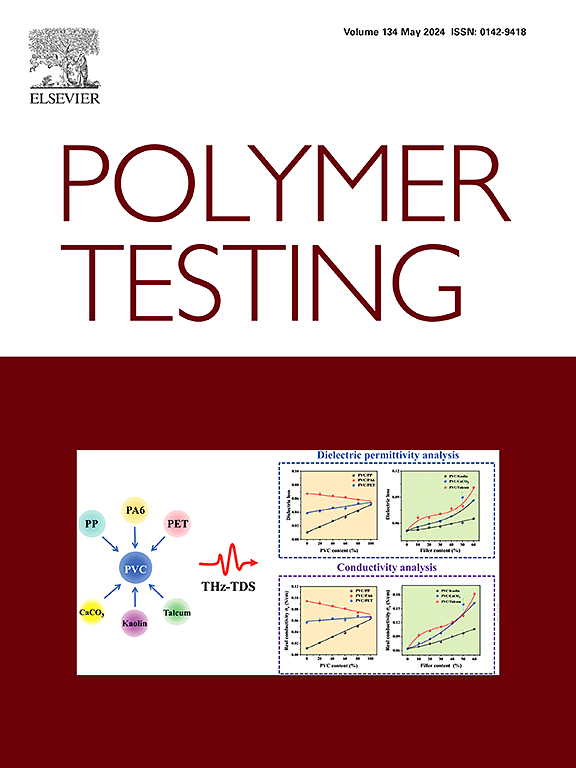Advancing thermal stability in natural ester oil-paper insulation systems via precision nanostructuring with parylene films: Experimental and molecular-level comprehensive assessment
IF 5
2区 材料科学
Q1 MATERIALS SCIENCE, CHARACTERIZATION & TESTING
引用次数: 0
Abstract
The oil-paper insulation system in eco-friendly fire-retardant transformers depends on hydrophilic natural ester insulating oil. Moisture within the system synergistically interacts with aging, worsening oil-paper insulation degradation and hastening overall system aging. Chemical vapor deposition was used to create parylene surface-modified insulating paper as a strategy to inhibit moisture-induced aging in natural ester oil-paper insulation. The effectiveness of the approach was identified by a comprehensive assessment of the physicochemical and electrical properties of the parylene surface-modified insulating paper. The findings from accelerated thermal aging at 130 °C for 90 days on the natural ester oil-paper insulation system reveal the outstanding lipophilic and hydrophobic properties while maintaining electrical characteristics of the parylene surface-modified insulating paper. After 90 days of aging, the parylene surface-modified insulating paper exhibited a 56.76 % higher degree of polymerization and a 19.36 % significantly lower moisture content than conventional cellulose insulating paper. In the natural ester oil-paper insulation system, the parylene surface-modified insulating paper led to a notable 63 % reduction in insulating oil acid value, a 60.50 % decrease in dielectric loss, and a substantial 20.35 % increase in AC breakdown voltage. Molecular-level investigations revealed the inhibitory mechanism of the parylene film, offering a promising solution to enhance the thermal stability and aging resistance of natural ester oil-paper insulation systems.
通过对二甲苯薄膜的精密纳米结构提高天然酯油纸绝缘系统的热稳定性:实验和分子水平综合评估
环保型阻燃变压器中的油纸绝缘系统依赖于亲水性天然酯绝缘油。系统中的水分会与老化产生协同作用,加剧油纸绝缘降解并加速整个系统的老化。化学气相沉积法用于制造对二甲苯表面改性绝缘纸,作为抑制天然酯油纸绝缘受潮老化的一种策略。通过全面评估对二甲苯表面改性绝缘纸的物理化学和电气性能,确定了该方法的有效性。天然酯油纸绝缘系统在 130 °C 下加速热老化 90 天的结果表明,聚对二甲苯表面改性绝缘纸在保持电气特性的同时,还具有出色的亲油和憎水特性。经过 90 天的老化后,与传统的纤维素绝缘纸相比,聚对二甲苯表面改性绝缘纸的聚合度提高了 56.76%,含水量显著降低了 19.36%。在天然酯油纸绝缘系统中,聚对二甲苯表面改性绝缘纸显著降低了 63 % 的绝缘油酸值,降低了 60.50 % 的介电损耗,并大幅提高了 20.35 % 的交流击穿电压。分子水平的研究揭示了对二甲苯薄膜的抑制机理,为提高天然酯油纸绝缘系统的热稳定性和耐老化性提供了一种可行的解决方案。
本文章由计算机程序翻译,如有差异,请以英文原文为准。
求助全文
约1分钟内获得全文
求助全文
来源期刊

Polymer Testing
工程技术-材料科学:表征与测试
CiteScore
10.70
自引率
5.90%
发文量
328
审稿时长
44 days
期刊介绍:
Polymer Testing focuses on the testing, analysis and characterization of polymer materials, including both synthetic and natural or biobased polymers. Novel testing methods and the testing of novel polymeric materials in bulk, solution and dispersion is covered. In addition, we welcome the submission of the testing of polymeric materials for a wide range of applications and industrial products as well as nanoscale characterization.
The scope includes but is not limited to the following main topics:
Novel testing methods and Chemical analysis
• mechanical, thermal, electrical, chemical, imaging, spectroscopy, scattering and rheology
Physical properties and behaviour of novel polymer systems
• nanoscale properties, morphology, transport properties
Degradation and recycling of polymeric materials when combined with novel testing or characterization methods
• degradation, biodegradation, ageing and fire retardancy
Modelling and Simulation work will be only considered when it is linked to new or previously published experimental results.
 求助内容:
求助内容: 应助结果提醒方式:
应助结果提醒方式:


